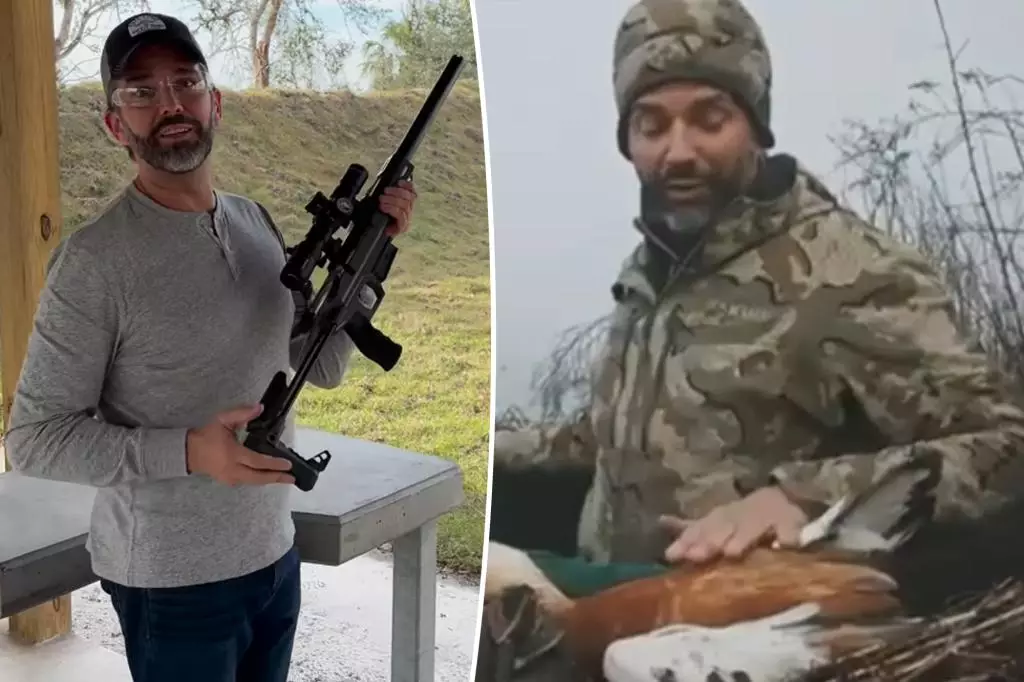Donald Trump Jr. finds himself under scrutiny once again, this time for his hunting activities in Italy, which have drawn ire from animal rights activists and local politicians. The events surrounding his duck hunting escapade have ignited a complex intersection of hunting ethics, legal regulations, and international relations. Here, we unpack the elements underlying this incident and the ramifications it presents for those involved.
Recently, a video emerged showing Donald Trump Jr. and a group of hunters shooting ducks in a lagoon near Venice. This outing took place in December, a time characterized by nostalgia and holiday cheer, yet it instead, has turned into a focal point for controversy. In the footage, Donald Jr. sported camouflage clothing as he participated in what was touted as a successful hunt. Claims made by a participant suggested that the group had an impressive catch, with estimates of around fifty ducks.
However, the backlash ignited when a rare duck, suspected to be a Ruddy Shelduck—an uncommon sight in Europe—was showcased among the deceased birds displayed in the video. These circumstances led to growing concerns among local residents and organizations committed to the preservation of wildlife, amplifying calls for legal scrutiny into the hunting practices showcased by Trump Jr.
Political Reactions: A Call for Accountability
The enthusiasm for hunting quickly turned sour as Italian politicians took to the media. Andrea Zanoni, a Green Party member, raised significant legal points regarding hunting regulations in Italy, emphasizing that hunting licenses must be obtained exclusively by residents of the country. The assertion that Trump Jr. might not have adhered to these local laws not only fosters public outrage but also gives ammunition to legal advocates fighting against perceived unequal treatment in such matters.
Luana Zanella, an Italian politician, suggested that the situation warrants intervention from the Minister of the Environment, underscoring the public sentiment that those who violate hunting regulations in the country should face the same consequences irrespective of their status or notoriety. The unease surrounding foreign hunters operating without requisite permits evokes broader questions about legality versus privilege.
Given the mounting pressure, Donald Trump Jr.’s spokesperson, Andy Surabian, responded swiftly to allegations of impropriety. The statement claimed that all necessary permits were secured, and the hunting took place in designated areas populated by various hunting parties. Surabian’s assurance reflects an effort to depict the hunting endeavor as compliant with legal standards, while also emphasizing that Trump Jr. takes conservation seriously.
Moreover, he pointed out the ambiguity surrounding who was responsible for the death of the rare duck, suggesting that it could have been shot by another member of the group or injured in a different context. This defensive narrative aims to mitigate the growing backlash while demonstrating cooperation with any investigations. However, the efficacy of this defense remains uncertain in light of public sentiment and the demands for accountability from local officials.
This incident is not merely a legal dispute; it invites scrutiny into the ethics of hunting, particularly by affluent individuals who engage in such activities abroad. While hunting can arguably be viewed as an outdoor tradition celebrated by many, high-profile hunting incidents often culminate in backlash due to perceptions of privilege and disregard for conservation laws. Trump Jr.’s history of controversial hunting trips, including a past incident involving a rare sheep in Mongolia, further complicates his public image and adds credence to detractors who argue that celebrity privilege often supersedes wildlife protection.
Given that hunting regulations exist to promote not only the health of ecosystems but also to uphold equitable access to natural resources, it becomes imperative that figures like Trump Jr. exemplify respect for these regulations. The implications of a singular act of hunting can ripple across social and environmental landscapes, leading to significant consequences for wildlife, governance, and cultural perceptions.
As the situation develops, it remains to be seen whether any formal charges will arise from this controversy. While Trump Jr. might navigate this particular storm, the incident shines a light on the broader concerns associated with hunting, legality, and ethical practices within the realm of conservation. The call for accountability from Italian activists and politicians highlights the need for responsible conduct from not only public figures but all engaged in hunting worldwide. Ultimately, it is crucial for individuals and organizations to reflect on their practices, ensuring that respect for the laws and ecosystems prevails above all else.

